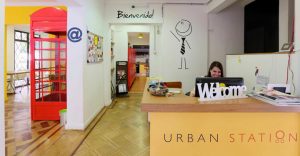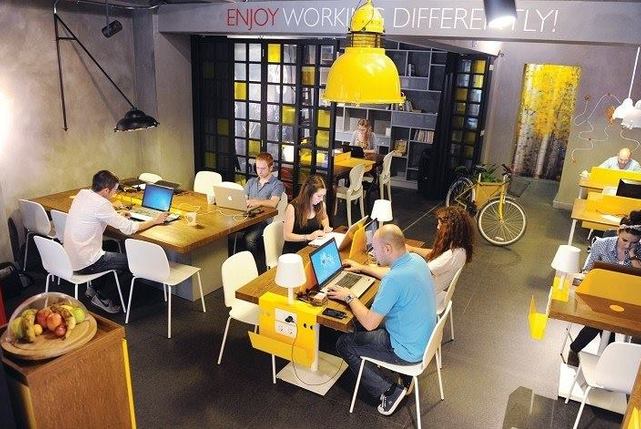The Latin American coworking scene is growing. 6 Years ago Urban Station coworking was founded in Buenos Aires and has since then continued to strengthen its leadership position in the Latin American coworking market. With 10 Latin American locations,including Chile, Colombia, and Mexico, the coworking franchise plan to expand to the USA and Canada.
Urban Station has also embraced corporate coworking, and has signed agreements with companies like Heineken, Motorola, Samsung, Microsoft, among others, with the aim to launch events and other networking opportunities for developing a market conducive to double-digit growth. We caught up with one of Urban Station’s founders, Florencia Faivich to find out more about Latin American coworking developments.
Hi, Florencia. Can you please tell us a bit about the Urban Station project and your role within the space?
We developed Urban Station to be aligned with our users’ needs. That was what motivated our four founders, Juan Pablo Russo, Marcelo Cora, Claudio Bisurgi and myself, to create this Project.
Coming from leadership positions in based in various corporations, our vision was to become the world’s first network for mobile workers, while also leading the development of the coworking movement in Latin America. Our business venture is one that unites modern design, every type of office service, a flexible system and the possibility of belonging to a like-minded community: these were all components of the initial setup’s “combo.”
As Urban Station is a network of spaces, what is the at the core value system of your network?
Our mission as a company, as stated by creator Juan Pablo Russo, is to democratize the office. We work every day to facilitate a daily office space for everybody. We don’t have memberships, we keep our doors open to all, and our motto is “enjoy working differently”.
Can you tell us a bit more about the Argentinian coworking scene?
The scene has evolved over the years, developing and gaining followers every day . Today there are more than 60 spaces throughout the country and the movement just continues to grow. The growing trend not only adds customers from the independent world, but also companies of all kinds are also working in such spaces.
Today, coworking spaces are part of the entrepreneurial ecosystem, which also involves universities, accelerators , organizations such as Endeavor and the National Government
What has been the impact Urban Station has had on the community?

Urban Station Coworking
Our proposal was well received in the market and we installed a different concept in the coworking market. Our flexible format allows our clients to use our spaces to work or meet differently by the time each one needs.
Our pillars include flexibility, cutting-edge design, and networking. So far, our concept has been very well received by both local and international press
Has there been a rise of freelancers in Argentina due to the economic crisis?
The economic crisis has been here for the last ten years, so the rise of freelancers is not only related to that issue. It’s more related to global trends that include a new generation of objectives sparked by the Y and Z generations, are more related to freedom in the workplace as opposed to the more corporate model.
Have freelancers, like in some other countries, been criticized for not having a “normal job” and has that improved?
Not at all. Being a freelancer is considered to be normal here. There have been and still are a lot of success stories regarding entrepreneurs and independent workers.
Are there still challenges for self-employed individuals?
Yes, of course. One of the big ones is being able to maintain stability. People here are open to working on different projects, so they manage at the end of the day. They are also open to finding solutions in order to maintain financial stability, by combining different things. Yet, like many places, we need more laws and benefits that will protect independent workers as well as the market.
And what are the benefits of having a franchise model, rather than a singular space?
The franchise model allowed us to expand quickly, inside and outside of Argentina. Today, we currently have branches in Argentina, Chile, Colombia , Mexico and Egypt and for the users, it gives them access to a wide network and this is key for them to develop their activities and skill sets. Today, work includes mobility in many cases, so to offer our members a network is a huge advantage.
What types of members do you typically host?
Our audience is very heterogeneous. From freelancers to startups, as well as designers, journalists, architects, consultants, human resources experts, web designers, and translators. Our spaces are also home to various companies of all sizes that use our meeting rooms, auditoriums, and access programs.
Do you have any corporations that also use Urban Station? If so, why do they choose to cowork?
Yes, there are several companies who choose to work with us for different reasons. For example, they use coworking as a way to install part of their teams for special assignments.
Flexibility and economic advantages introduce them to the space and thus they share it with other entrepreneurs who nurture their creativity and spirit by working together. We also have developed different programs for companies on top of our offer of a remote office for their employees
Can you elaborate on the “Your office will follow you” program?
We have changed the paradigm. People spend a significant amount of time in their office, so we are trying to make a more dynamic work environment by creating different spots, kind of like subway stations so that the office can follow you wherever you choose to go. Our business model allows to spontaneous work of meetup area whenever and wherever our corporates clients want it.
You offer transition spaces. Have you ever had cases where a company would rent on a flexible basis and decide to join Urban Station as members?
Yes, it happens often. Many companies come to work on a project, but would prefer to extend, which is not always possible. Thus, enjoy the space, the environment, flexibility and good energy that is generated!



0 Comments